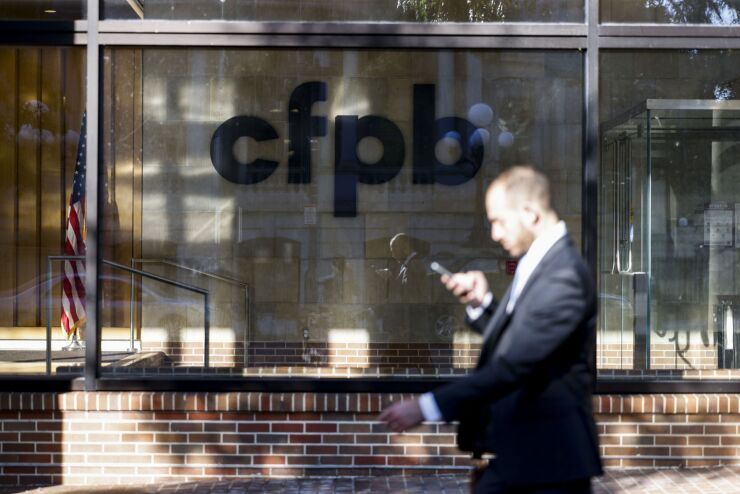
WASHINGTON — Questions added to the Consumer Financial Protection Bureau's consumer complaint form could portend a new enforcement front for the bureau, according to some industry experts.
The new questions are part of a
That opinion, which hinges on a provision in the Consumer Financial Protection Act, 1034(c), outlines how financial companies that the CFPB oversees need to "comply in a timely manner with consumer requests for information" about their accounts. Specifically, the guidance stakes out the position that companies can't charge "excessive fees" for the requests for information.
At the time, the CFPB said it didn't intend to seek monetary relief for potential violations until Feb. 1, 2024 — a deadline that passed almost a year ago.
At some point in the last year — likely sometime in or after August — the CFPB began asking consumers who submitted complaints to the bureau whether they had requested information from the institution they were complaining about.
The CFPB now asks whether a consumer has tried to fix the problem with the company in question. If the consumer responds affirmatively, the bureau asks what kind of information was requested and if the company provided it.
McCarthy said the questions relate to the advisory opinion, and the data that they're collecting is not available in the version of the CFPB database that's publicly available but is of a kind of data that's typically used by the bureau for enforcement purposes.
"This is a big thing — this train is coming," he said. "They've already issued the warning that they're going to be doing something about it, so you tie it all together and at minimum we have an important notice to send to the marketplace to say, 'Hey, this is happening.'"
There's a gap, he said, between the CFPB's expectations and the traditional process that banks and other financial institutions go through when consumers request this kind of information. Often, a consumer will have to jump over hurdles and face delays in getting that information and fees in order to access information that 1034(c) says they're entitled to.
"The kicker is, there is no infrastructure in the banking industry that can control this," he said. "There are no input channels, there are no procedures. There's no formal definition of what a consumer can request and not request."
Richard Horn, co-managing partner at Garris Horn LLP and former senior counsel and advisor at the CFPB, said the addition of the questions makes sense in the context of the CFPB's Feb. 1 date spelled out in the advisory opinion.
"It's one thing to have a policy, and it's another thing to have a practice of not charging for this type of, essentially, customer service and responding to consumer requests for information," Horn said. "I think that's probably why they added it to the consumer complaint form, because consumers that are complaining typically have had interaction with the institution before they take the step of submitting a consumer complaint."
The questions could also give the CFPB insights into trends at particular institutions.
"So if this seems to be coming up a lot with a particular institution, maybe they decide to start an enforcement action against the institution," he said. "They weren't planning on enforcing any activity before February 2024, but we're well past that, so I think that new consumer complaints database information could be a resource for the bureau."
The CFPB's advisory opinion has faced pushback from the banking industry. In January, a group of banking organizations — including the Bank Policy Institute and the Consumer Bankers Association, along with the American Financial Services Association and the U.S. Chamber of Commerce —
In February, the American Bankers Association said the CFPB went "far beyond the statute" in its advisory opinion.
"Printing and mailing paper statements, providing balance information over other banks' ATM networks, conducting complex research, and other activities impose costs in the form of personnel hours, materials, postage, software investments, and core provider services," the trade group said. "The CFPB has not considered the cost burden associated with providing these services without assessing a fee."
It's unclear what future the current CFPB's interpretation of 1034(c) will have
"I think what they would need to do is immediately revisit actions taken by the CFPB over the last year, both final regulations and proposed regulations," Lynyak said. "And depending on who the leadership is, it is going to depend on how aggressive they are on revisiting, reproposing or going through a significant amending process that would freeze compliance while a new proposal is being considered."






